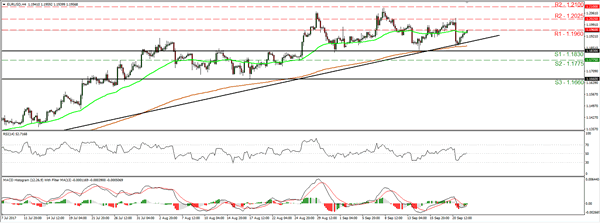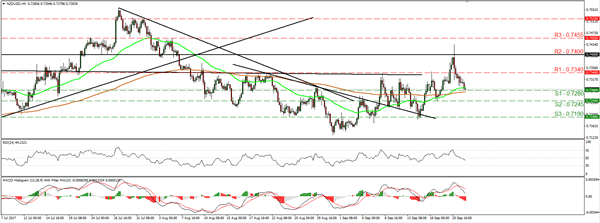On Sunday, German citizens will head to the polls to elect their new Chancellor. Unlike the bloc’s recent elections, this battle appears to be more traditional in nature, as the two main parties hold very similar views on key issues. According to almost every opinion poll, another victory by incumbent Chancellor Merkel is perceived as certain. As such, we believe the market reaction on the actual vote may be relatively limited, with risks tilted towards a small relief bounce in the euro and European stocks in case Merkel wins as expected.
However, Merkel will probably need to strike a coalition with other parties, as she is unlikely to gain enough popularity to govern alone. We believe that any major market reaction in the aforementioned asset classes may result from who Merkel chooses to align herself with, something that will become clearer towards the end of October. The political alliance she forms could determine whether much-needed EU reforms will materialize, such as the creation of a position for an EU Finance Minister, a shared euro-budget, and further banking sector integration. The most market-friendly outcome may be a continuation of the current ‘Grand coalition’ with the SPD, Germany’s second largest party, considering its pro-EU stance.
EUR/USD edged north on Thursday after it hit support at the medium-term uptrend line taken from the low of the 17th of April. At the time of writing, the rate is testing the 1.1965 (R1) level, where an upside break may open the way for another test near our next resistance of 1.2025 (R2). Our momentum studies support the case for the pair to continue trading higher for a while. The RSI rebounded and emerged back above its 50 line, while the MACD, although negative, has bottomed and just poked its nose above its trigger line. It could turn positive soon.
New Zealand election: A neck and neck battle?
On Saturday, New Zealand will hold its own General election. Most opinion polls suggest a very tight race between the incumbent National Party and the Labor Party. Judging from how the Kiwi has reacted to opinion polls so far, a victory by the Nationals would probably prove beneficial for the currency, whereas a potential Labor win could weigh on NZD. This may be the case due to the different stances these two parties hold on trade policy. The Nationals represent the status quo, and advocate continued free trade. However, Labor has stated they are open to renegotiating trade deals such as the Trans-Pacific Partnership (TPP). Considering how heavily reliant New Zealand is on international trade, such a renegotiation could hurt exporting firms and thereby, slow the economy.
NZD/USD continued trading lower yesterday, falling below the support (now turned into resistance) of 0.7340 (R1). Currently the rate is testing the 0.7280 (S1) support, where a dip may pave the way for our next obstacle of 0.7245 (S2). Nevertheless, a lot of the pair’s forthcoming direction will depend on the outcome of New Zealand’s General Election. If the Nationals win, the pair could rebound, break above 0.7340 (R1) and perhaps challenge once again the important territory of 0.7400 (R2). On the other hand, a Labor victory could hurt the Kiwi, and probably push the rate down towards the 0.7190 (S3) support area.
Switching to the daily chart, we see that on Wednesday, NZD/USD was rejected strongly from above the 0.7400 (R2) key obstacle and subsequently it retreated back within the longer-term wide sideways range between that barrier and the support of 0.6880. As such we will hold a neutral stance with regards to the broader outlook, unless a Nationals’ victory encourages the bulls to overcome the 0.7400 (R2) critical obstacle.
Today’s highlights:
During the European day, we get the preliminary manufacturing and services PMIs for September from several European nations and the Eurozone as a whole. The forecast is for most of these indices to tick down or to remain unchanged, which could weigh on the euro a little. In Canada, the headline CPI rate for August is expected to have risen, while no forecast is available for the core. We see the case for an uptick in the core rate as well, as the manufacturing PMI showed another sharp rise in selling prices. This could bring CAD under buying interest.
We have two speakers on the agenda: ECB President Mario Draghi and UK Prime Minister Theresa May. With regards to Draghi, focus may be on any hints as to whether the ECB is headed for a ‘dovish tapering’. As for PM May, she will be speaking about the future EU-UK relationship and quite possibly, the Brexit divorce bill. If she offers an amount that is seen as adequate, we may see speculation that the pace of Brexit negotiations may accelerate, something that could support the pound a bit.
EUR/USD

Support: 1.1830 (S1), 1.1775 (S2), 1.1660 (S3)
Resistance: 1.1965 (R1), 1.2025 (R2), 1.2100 (R3)
NZD/USD

Support: 0.7280 (S1), 0.7245 (S2), 0.7190 (S3)
Resistance: 0.7340 (R1), 0.7400 (R2), 0.7455 (R3)
